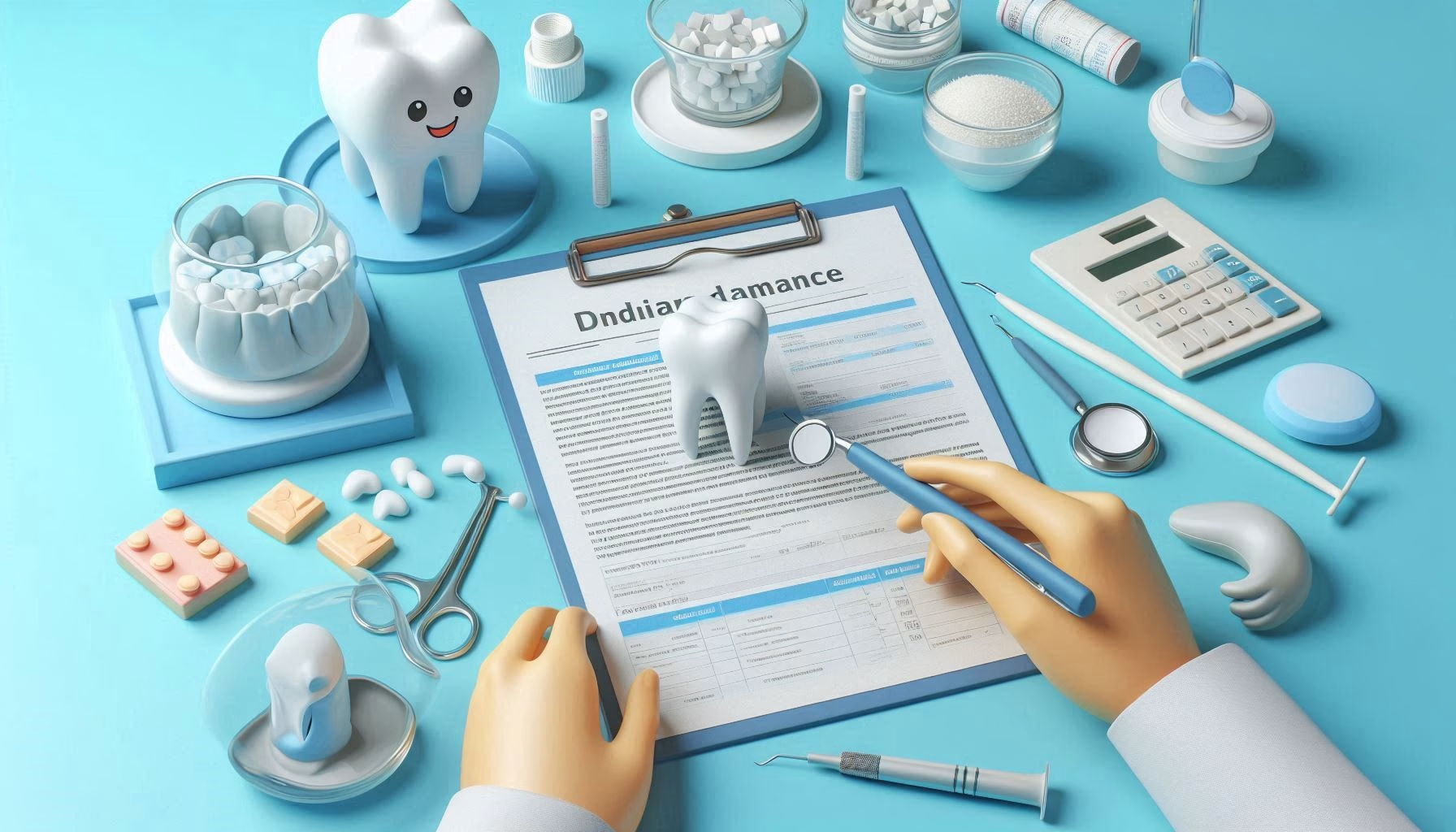Table of Contents
- Overview
- Definition of Dental Insurance and Its Coverage
- What are the Benefits of Dental Insurance?
- What are the Types of Dental Insurance?
- How Much Is the Dental Insurance Premium?
- Understanding and Submitting a Dental Insurance Claim
- Requirements for Submitting a Dental Insurance Claim
- Submitting a Dental Insurance Claim
- The Conclusion
Overview
Dental insurance is a service offered as an additional benefit, or riderRider (Additional Benefit) Additional products from insurance to increase coverage of the main benefit or additional insurance protection at a lower cost., to health insurance. Typically sold as a separate policyPolicy The policy is a binding agreement and is agreed upon by the insurance company and policyholder in writing. An agreement made by the policyholder with an insurance company. from health insurance, it can be acquired by customers who require it.
Dental insurance is a service that is just as crucial as health insurance itself. However, in practice, the utilization of this insurance service remains relatively low in the country.
Definition of Dental Insurance and Its Coverage

Dental insurance is a type of insurance coverage that pays for various dental care expenses, including basic treatments, complex procedures, and denture fittings.
Typically, dental insurance is offered as an additional benefitRider (Additional Benefit) Additional products from insurance to increase coverage of the main benefit or additional insurance protection at a lower cost., known as a rider, from health insurance providers. Consequently, the majority of dental insurance policyholders are individuals who already possess health insurance.
In addition to rider systems, many insurance companies offer standalone dental insurance plans that can be acquired independently of health insurance.
Unit dental insurance, sold separately from health insurance, typically covers the following:
| Complex Care | This treatment includes several procedures, such as dental filling, tartar removal, and tooth extraction. |
| Denture Installation | This treatment involves surgical procedures and the placement of dental implants. |
| Denture Installation | This particular action will be covered by the insurance company, provided it receives approval from a doctor. |
What are the Benefits of Dental Insurance?
Dental insurance is often overlooked when considering health coverage, but it plays a crucial role in maintaining overall health and well-being. Understanding the benefits of dental insurance can help you make informed decisions about your oral health care. Here are some key advantages of having dental insurance:
Benefits of Dental Insurance No.1
InsuranceWhat.com
Cost Savings on Preventive Care
One of the most significant benefits of dental insurance is the coverage of preventive care. Most dental insurance plans cover routine check-ups, cleanings, and X-rays at 100%. These preventive measures are essential for maintaining good oral health and catching potential issues early before they become more serious and costly to treat.
Benefits of Dental Insurance No.2
InsuranceWhat.com
Reduced Costs for Major Procedures
Dental insurance can significantly reduce the out-of-pocket costs for major dental procedures. Treatments such as fillings, root canals, crowns, and extractions can be expensive. With dental insurance, a portion of these costs is covered, making it more affordable to get the necessary treatments. This financial support can prevent delays in receiving care due to cost concerns.
Benefits of Dental Insurance No.3
InsuranceWhat.com
Support for Orthodontic Treatments
Some dental insurance plans offer coverage for orthodontic treatments, such as braces or aligners. Orthodontic care can be expensive, and having insurance coverage can make it more accessible for those who need it. This is particularly beneficial for families with children who may require orthodontic treatment.
Benefits of Dental Insurance No.4
InsuranceWhat.com
Improved Overall Health
Oral health is closely linked to overall health. Poor oral health can contribute to various health issues, including heart disease, diabetes, and respiratory infections. By providing access to regular dental care and treatments, dental insurance helps improve overall health and well-being.
Benefits of Dental Insurance No.5
InsuranceWhat.com
Financial Predictability
Dental insurance provides financial predictability by covering a portion of dental care costs. This can help individuals and families budget for dental expenses more effectively. Knowing that you have coverage for routine and unexpected dental care can reduce financial stress and allow for better financial planning.
What are the Types of Dental Insurance?
Dental insurance is typically categorized into two main types:
Types of Dental Insurance No.1
InsuranceWhat.com
Health + Dental Insurance
This coverage is commonly known as dental insurance. It is a service that can be acquired concurrently with health insurance. Dental insurance serves as a rider—an additional feature—to the primary health insurance policy. It is an ideal option for customers seeking to purchase both dental and health insurance simultaneously.
Types of Dental Insurance No.2
InsuranceWhat.com
Stand Alone Insurance
This type of dental insurance is standalone, meaning it doesn’t need to be bought in conjunction with health insurance or any other insurance types. Standalone insurance can be a viable option for customers who already possess health insurance services, or for those who desire a dental insurance policyInsurance policy An agreement between the policyholder and the insurance company to perform the obligations as agreed by both parties. independent from their health insurance.
The selection of dental insurance can certainly be tailored to the specific needs of the policy. If you already possess health insurance that includes dental coverage (rider), it is perfectly fine to continue with this insurance, provided that the coverage meets your requirements.
If dental insurance riders are insufficient, then purchasing stand-alone dental insurance may be worth considering. This type of insurance provides customers with broader and more comprehensive coverage. However, opting for dental insurance separate from health insurance will typically result in higher premiumsPremium The money that must be paid at a certain time is the obligation of the insurance policyholder. The amount of premium paid is determined by the policy and approval of the insurance company in accordance with the conditions of the insured. The nominal payment approved by policyholders and insurance companies. Premium payment will be made according to the agreement, it can be monthly, yearly, or according to the agreement..
Ensure that you select and tailor your dental insurance to meet your specific protection needs. This is crucial to guaranteeWarranty Statement A statement issued by a potential customer regarding the condition of the person or thing insured. that the insurance product offers the maximum benefits possible.
How Much Is the Dental Insurance PremiumPremium The money that must be paid at a certain time is the obligation of the insurance policyholder. The amount of premium paid is determined by the policy and approval of the insurance company in accordance with the conditions of the insured. The nominal payment approved by policyholders and insurance companies. Premium payment will be made according to the agreement, it can be monthly, yearly, or according to the agreement.?
Dental insurance is an essential aspect of maintaining oral health without breaking the bank. However, understanding the cost of dental insurance premiums can be a bit complex due to various factors that influence the price. This article will explore the different elements that determine the cost of dental insurance premiums and provide a general idea of what you can expect to pay.
The cost of dental insurance premiums can vary widely. On average, dental insurance premiums range from $7 to $87 per month. Here’s a breakdown of what you might expect:
- Basic Plans: These plans typically cover preventive care such as cleanings and check-ups. Premiums for basic plans can start as low as $7 to $15 per month.
- Mid-Range Plans: These plans offer a balance between cost and coverage, including preventive care and some basic procedures like fillings. Premiums for mid-range plans usually range from $20 to $40 per month.
- Comprehensive Plans: These plans provide extensive coverage, including major procedures and sometimes orthodontics. Premiums for comprehensive plans can range from $50 to $87 per month.
Understanding and Submitting a Dental Insurance ClaimInsurance claim A formal request made to the insurance company for compensation based on the terms of the insurance policy or agreement.

There are two simple methods to submit a dental insurance claim:
| Cashless System | Reimbursement System |
| Submitting a claimClaim The demands are given by the insurance policyholder to get the right properly so that the insurer pays the conditions according to the existing procedure. is straightforward; customers simply present their insurance card when receiving the dental care they require. | In this claim system, customers are required to initially cover their dental care expenses out-of-pocket and subsequently file a claim for reimbursement with their insurance provider. The extent of reimbursement, whether partial or full, is determined by the insurance company’s specific policy. |
Requirements for Submitting a Dental Insurance Claim
The submission of dental insurance claimsInsurance claim A formal request made to the insurance company for compensation based on the terms of the insurance policy or agreement. should be carried out according to the policiesPolicy The policy is a binding agreement and is agreed upon by the insurance company and policyholder in writing. An agreement made by the policyholder with an insurance company. established by the insurance company. Moreover, customers are required to fulfill all the stipulated requirements to submit their claim correctly.
Some conditions that must be satisfied when submitting a dental insurance claim include:
- A filled-out dental insurance claim submission form.
- Insurance policy (original)
- Receipt and details of dental care costs (original)
- Copy of prescription as well as details of medications.
- Doctor’s certificate.
- Copy of laboratory results.
- A local police certificate is required if the treatment is related to an accident.
- Please include any additional supporting documents that may be relevant.
Submitting a Dental Insurance Claim
To submit a dental insurance claim, one must follow the procedures based on the received treatment or action. Additionally, customers should align their claim submission with the claim processing system of the insurance company they have chosen.
When utilizing a cashless system, customers are required to have their insurance participant card and identity card ready for dental treatments. Typically, these documents are necessary for the registration process.
However, utilizing the reimbursement system allows for claim submission by fulfilling all the necessary requirements as previously mentioned. All relevant documents should be sent to the insurance company or delivered in person to the closest branch office to proceed with the claim.
The Conclusion
Utilize Dental Insurance Appropriately and When Necessary
Dental insurance is a crucial insurance product to possess. It offers benefits for routine care and covers a range of other dental procedures. Selecting the appropriate dental insurance that aligns with your needs ensures that you receive the utmost benefits from the product.
Do you think you have other ideas about Dental Insurance: Understanding Coverage and Benefits? You can comment and share your thoughts below, or discuss more in the InsuranceWhat Forum. Also, read more articles about GLOBAL INSURANCE or other interesting insurance topic articles only at InsuranceWhat.com.





